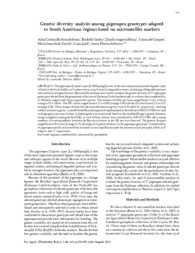Genetic diversity analysis among pigeonpea genotypes adapted to South American regions based on microsatellite markers.
Genetic diversity analysis among pigeonpea genotypes adapted to South American regions based on microsatellite markers.
Author(s): SOUSA, A. C. B.; GODOY, R.; SFORÇA, D. A.; CAMPOS, T. de; ZUCCHI, M. I.; JANK, L.; SOUZA, A. P. de
Summary: The pigeonpea [Cajanus cajan (L) Millspaugh] is one of the most important perennial legume crops utilized in the food, fodder, soil conservation, crop-livestock integrated systems, reclaiming of degraded pastures and symbiotic nitrogen fixation. Microsatellite markers were used to estimate the genetic diversity of 77 pigeonpea genotypes selected from the germplasm collections at Embrapa Cattle-Southeast and, to evaluate their transferability to Phaseolus vulgaris and Vigna unguiculata species. The number of alleles per locus ranged from 2 to12, with an average of 5.1 alleles. The PIC values ranged from 0.11 to 0.80 (average 0.49) and the D values from 0.23 to 0.91 (average 0.58). The averages of observed and expected heterozygosity were 0.25 and 0.47, respectively, showing a deficit in heterozygosity. A model-based Bayesian approach implemented in the software STRUCTURE was used to assign genotypes into clusters. A dendrogram was constructed based on the modified Roger's genetic distances using a neighbor-joining method (NJ). A total of four clusters were assembled by STRUCTURE and a strong tendency of correspondence between the Bayesian clusters in the NJ tree was observed. The genetic distance ranged from 0.09 to 0.62 (average 0.37), showing a low genetic diversity in the pigeonpea genotypes. Transferability of pigeonpea-specific microsatellites revealed a cross-amplification and the presence of polymorphic alleles in P. vulgaris and V. unguiculata.
Publication year: 2011
Types of publication: Journal article
Unit: Embrapa Acre
Keywords: Análisis estadístico, Bayesian inference, Beans, Cajanus cajan, Computer simulation, Diversidade genética, Feijão, Feijão de corda, Frijoles, Genetic markers, Genetic polymorphism, Genetic variation, Guandu, Guandul, Inferência bayesiana, Marcador genético, Marcador molecular, Marcadores genéticos, Microssatélite, Modelo de simulação, Método estatístico, Phaseolus vulgaris, Pigeon peas, Polimorfismo genético, Simulación por computadora, Sofware Structure, Statistical analysis, Variación genética, Variação genética, Vigna unguiculata
Observation
Some of Embrapa's publications are published as ePub files. To read them, use or download one of the following free software options to your computer or mobile device. Android: Google Play Books; IOS: iBooks; Windows and Linux: Calibre.
Access other publications
Access the Agricultural Research Database (BDPA) to consult Embrapa's full library collection and records.
Visit Embrapa Bookstore to purchase books and other publications sold by Embrapa.

